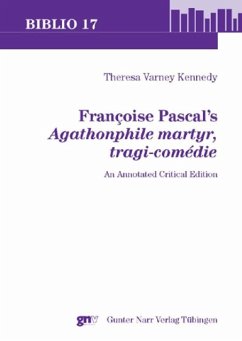Written at the end of the Counter Reformation, Françoise Pascal’s first play, Agathonphile martyr, tragi-comédie (1655), is an important transitional piece, marking the passage from religious drama as a moralizing device to that of a diversion, prompted by the growing influence of the société mondaine in Lyon. In her introduction, Kennedy examines how this play is characterized by a unique merging of two genres; the tragicomedy and the martyr play. This play also merits our attention in terms of new female characterization. Kennedy demonstrates how Pascal’s female martyr Triphine diverges from the traditionally "cold-hearted" female martyr, as an independent thinker who speaks her heart, proclaiming the virtues of 'constant' love.
Table of contents:
Introduction: Françoise Pascal, 'fille lyonnoise'; Part I: Analysis of Agathonphile martyr, tragi-comédie; The 17th century martyr play; 17th century gallantry; The female martyr in 17th century drama; Agathonphile martyr as political propaganda?; Conclusion; The Edition; Summary; Part II: Agathonphile martyr, tragi-comédie; References
Hinweis: Dieser Artikel kann nur an eine deutsche Lieferadresse ausgeliefert werden.
Table of contents:
Introduction: Françoise Pascal, 'fille lyonnoise'; Part I: Analysis of Agathonphile martyr, tragi-comédie; The 17th century martyr play; 17th century gallantry; The female martyr in 17th century drama; Agathonphile martyr as political propaganda?; Conclusion; The Edition; Summary; Part II: Agathonphile martyr, tragi-comédie; References
Hinweis: Dieser Artikel kann nur an eine deutsche Lieferadresse ausgeliefert werden.

